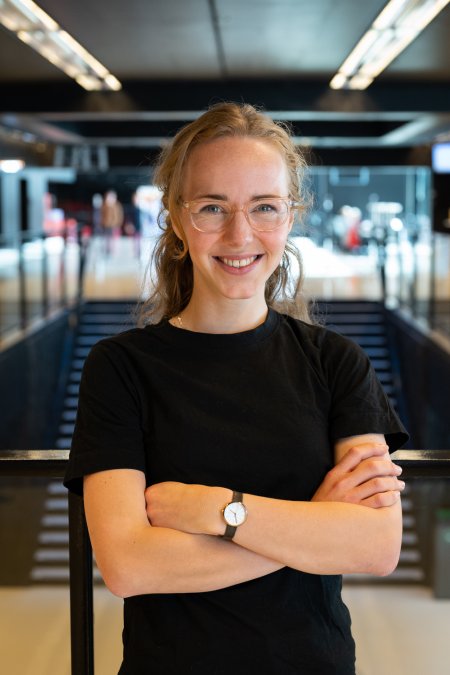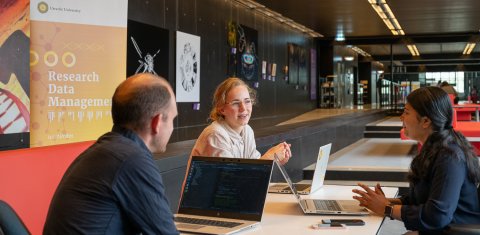Why Hanne Oberman visited the Walk-in hours
From the 9th of May onwards, Research Data Management Support and the Open Science Community Utrecht will be organising Walk-in hours every Monday afternoon. Researchers and master students are welcome to visit with any questions about research data, data storage, GDPR, research software, open science and other topics they come across in their research. Hanne Oberman decided to visit the Living Lab that first Walk-in hour and shares her experience.
“I developed software for my research in the Missing Data Research Group (Methodology & Statistics). Missing data is a large and frequent problem for researchers. Already a lot of software has been developed to handle this issue. Now I am mostly concerned with the last step: visualising missing data-issues, evaluating solutions and statistical analyses of incomplete data. I developed a package in R for this (R is a powerful scripting language for data handling, data visualisation, and statistics, ed.). I had a number of questions about this software, like: ‘How can I make it as FAIR as possible? Am I missing things that could improve the software? How can I make it as easy as possible for other researchers to contribute and refer to the software?” When Hanne saw the announcement for the Walk-in hours, she knew this is where I’m taking my questions. She wanted someone with the right expertise to be her sparring partner. “Because it is a Walk-in hour, I felt free to just walk in with an open attitude.”
What does Hanne Oberman do?
Hanne works as a junior researcher for Methodology & Statistics in the Faculty of Social Sciences. January 2023 she will start her PhD, at the moment she is still a research and education assistant. She teaches statistics to students in the social sciences and applied data science two days a week, works in the UMC Utrecht as research assistant two days a week, and is research assistant for open software for data analyses one day a week. “A full and diverse workweek”, Hanne says enthusiastically.
Backstage

The main reason Hanne wanted to make her software as FAIR as possible, is that she is an open science advocate. “I really see that as the future. I am working on an application for the Open Science Fund right now to develop yet another software package together with my supervisor.” With her background in psychology and the replication crisis in this field around 2010, Hanne sees open science as one of the ways to prevent a similar crisis in the future. “I would like software to be published open access. SPSS for example, is a bit of a black box. You teach students how to use it, but in fact a lot of information stays hidden. I would love software to not only be user friendly, but also to allow you to take a peak backstage.” Hanne tells her students there are alternatives, that do give the opportunity view behind the scenes. “But most bachelor students have a thesis supervisor that is used to working with SPSS, so that makes it hard.”

The Shiny app: for researchers who are not into programming
Hanne had another question for the data managers and research engineers: she wants to create a Shiny app and wanted to know if that is possible. A Shiny app is an interactive web application, a user interface that you can build on top of R. "People that are not familiar with the programming language R can use this app to still do analyses or make visualisations in R. In fact, a Shiny app exists for people who can’t “do” R." Hannes question about the Shiny app was specifically about data privacy. "I would like researchers to be able to upload their data and create data visualisations in the online environment. But Neha and Jelle (respectively data manager and research engineer, both work at the RDM Support team, ed.) told me there is a certain risk involved. Once you upload the research data you might not be compliant with the GDPR. I asked them: ‘Can we, in Utrecht University, create a safe environment for researchers to make this possible?’ It takes a lot of time to realize such a thing. Maybe an environment like that will only be available by the time I’ve finished my PhD."
Low threshold
Not only did Hanne get answers to all her questions on site, but she also received a lot of information by email afterwards. "Both Neha and Jelle emailed me a list of resources. About how to check if your software is FAIR for example, and an example of another Shiny app that was built at the university. And about how to get a Digital Object Identifier (DOI) for your software. How others can refer to your software and more information about making your software more FAIR." Hanne also was advised to take the ‘Best Practices for Writing Reproducible Code’ workshop.
Why Hanne would advise her fellow researchers to come to the Walk-in hours
Why does Hanne advise her fellow researchers to take their questions about research data and software to the Walk-in hours? "The threshold is low, and I’ve spoken to people who helped me take my research in the field of research data, software and open science, a step further. Despite the fact I am already involved in open science and am familiar with a lot of RDM-tools, I don’t know it all. It’s very nice that this interdisciplinary team has such rich experience and is in the loop of all the recent developments in data, software and publishing."
Come to the Walk-in hours
Every Monday from 15:00 to 17:00 hours there are Walk-in hours. Check the RDM Support Calendar for more information and the location. Any questions? Email: info.rdm@uu.nl

